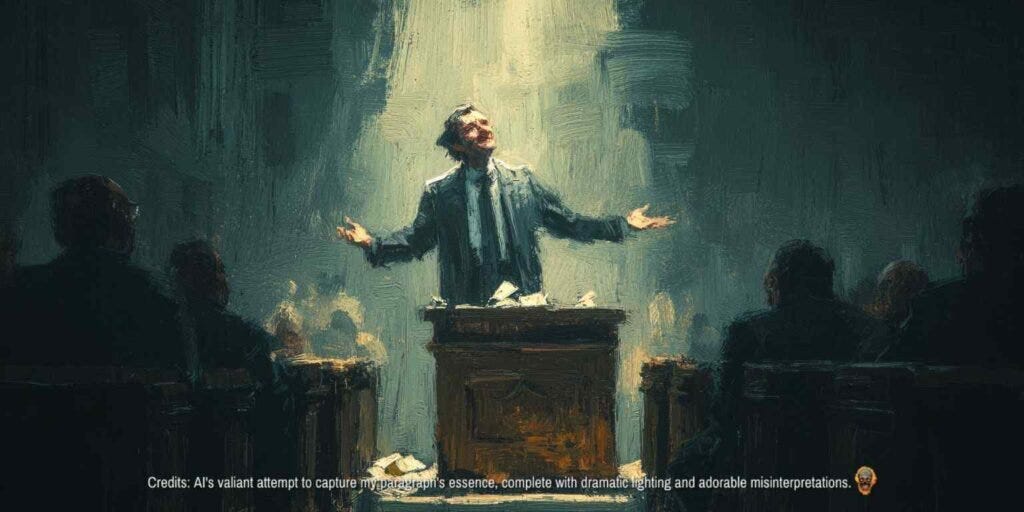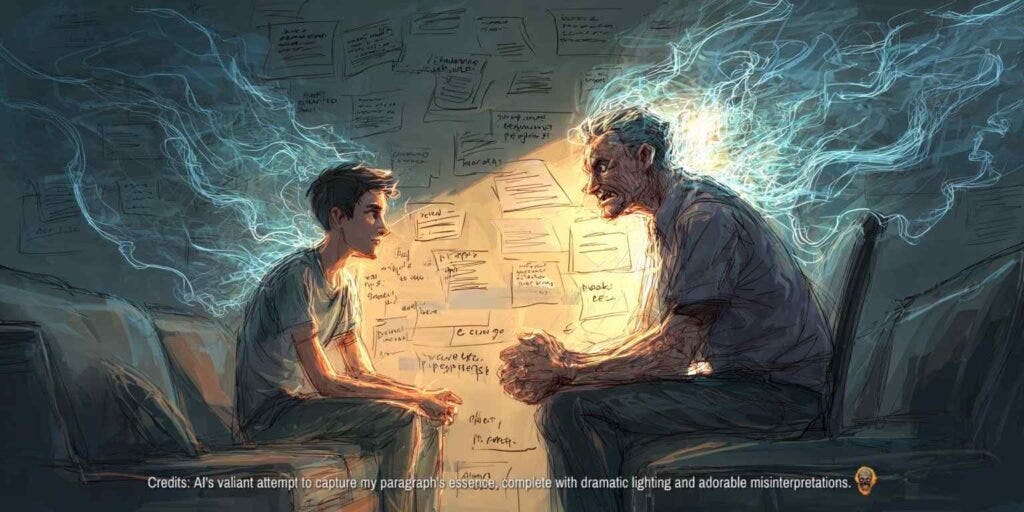Your compassion is fake.
What passes for spiritual virtue is often nothing but ego in disguise, a clever mask for your need to feel superior. The bleeding heart of spirituality beats not with love but with narcissism.
Picture the scene: Jane donates to charity, posts about it on social media, then spends the day basking in her own goodness. She feels elevated, special, somehow more evolved than others. Her friends praise her generosity, unaware they’re feeding a beast wearing an angel costume.
This “compassionate” behavior runs rampant in spiritual communities where practitioners compete in kindness olympics. Who can be most understanding? Who gives most selflessly? The irony cuts deep.
The truth hurts: your spiritual ego has found its perfect hiding place…
…right behind your compassionate smile.
Needs an Object vs. Impersonal Action
Egoic helping requires a victim.
It demands someone lower, someone broken, someone you can fix with your magnificent presence. This compassion divides the world into helpers and helpless, saviors and saved.
Consider Mark, the perpetual volunteer who only serves at soup kitchens where cameras might catch his kindness. He needs visible poverty, desperate faces looking up at him with gratitude. Without this imbalance of power, his good deeds wither. The glow he feels comes not from service but from comparison – “Look how fortunate I am compared to these poor souls.” His kindness creates distance, not connection.
True compassion recognizes no separation. The hand that gives and the hand that receives belong to the same body. No drama, no story, no identity reinforcement.
When division dissolves, what remains cannot be called compassion. It becomes simply the left hand bandaging the right…
…without thinking itself heroic for doing so.
Driven by Feeling Good vs. Simple Action
Your help comes with hidden payment.
That warm feeling filling your chest when you assist others? That’s your ego collecting its fee. You help not because help is needed but because helping makes you feel virtuous.
A woman rushes to comfort a crying stranger. Kindness, yes? Look closer. She leaves feeling proud, telling friends later about her good deed. Her day brightens from the encounter. Who really benefited more? Her compassion was transactional – emotional payment for services rendered. This emotional kickback proves the action served her self-image first, others second.
Genuine compassion expects no emotional reward. It responds as naturally as your hand pulls back from fire. No calculation, no internal accounting of karmic points.
When helping happens without the helper seeking emotional profit, the action emerges from clarity…
…not from the need to feel good about yourself.
Seeks Recognition vs. Needs No Witness
Your compassion loves an audience.
It performs best with witnesses, grows stronger with praise, and withers in secrecy. This compassion needs validation like lungs need oxygen.
James donates generously to his church, but only when the pastor acknowledges donors by name. His charity diminishes when given anonymously. His kindness broadcasts on social media but vanishes when no one’s watching. His good deeds aren’t expressions of inner truth but performances for external validation.
Actual compassion works just as effectively in darkness. It requires no applause, seeks no acknowledgment, and leaves no signature. It happens because it happens, not because someone will notice.
The ultimate test: would your compassionate behavior continue if nobody ever knew…
…including yourself?
Identifies with Suffering vs. Sees with Clarity
Your pity reinforces the suffering.
By emotionally merging with others’ pain, you create a feedback loop of misery that serves neither party. Your tears for their situation only double the suffering in the world.
Sarah encounters a homeless man and becomes overwhelmed with emotion. “How terrible!” she thinks, projecting herself into his situation. Her sentiment creates nothing useful – just another person feeling bad. She confuses emotional resonance with understanding, empathetic distress with clarity. The man doesn’t need her tears; he needs practical help or to be seen without judgment.
Clear compassion sees suffering without becoming suffering. It responds without the emotional drama, without the story, without the sentiment.
When you stop drowning alongside the drowning man, you might actually notice the life preserver within reach…
…and both of you can breathe again.
Has an Agenda vs. No Expectations
Your kindness comes with conditions.
Beneath your helpful exterior hides an expectation – that they should change, improve, or at minimum, express sufficient gratitude. Your compassion has a secret contract.
George mentors troubled teens, appearing selfless. Yet watch him seethe when his advice goes unheeded or when thanks never arrives. His “unconditional” help reveals its conditions through his disappointment. His giving was actually a form of control, an attempt to shape others into what he thinks they should become.
True response to suffering carries no fine print, no hidden clauses about required outcomes. It gives without demanding specific results.
Freedom exists only in the space where expectations dissolve and action arises without the burden of demanded outcomes…
…a space your ego cannot comprehend.
Can Lead to Burnout vs. Sustains Itself
Your compassion drains you empty.
The helper’s fatigue, the volunteer’s exhaustion, the caregiver’s collapse – all testify to the fundamental error in your approach. True energy never depletes itself.
Lisa, a hospice nurse, began with genuine desire to serve. Five years later, she’s bitter, resentful, counting days to retirement. What happened? She gave from her personal reserves, from her limited ego-identity. She thought she was the source of compassion rather than its channel. The self that gives inevitably exhausts because it draws from a finite well.
Natural compassion flows through you, not from you. It draws from the infinite, not the personal. The helping happens without the fiction of a helper carrying the load.
When the doer dissolves, the doing continues without effort, like water flowing downhill…
…never tired of finding its level.
Reinforces Roles vs. Dissolves Separation
Your help traps both parties.
The giver and receiver, locked in their respective roles, reinforcing the very separation that creates suffering. Your compassion becomes another chain binding both of you.
Paul proudly calls himself a “healer,” building his identity around fixing others. His clients become “the broken ones” needing his special gifts. This dynamic ensures neither party evolves beyond their assigned role. Paul needs broken people to maintain his healer identity. His clients need a healer to avoid responsibility for their own wholeness. The roles become prisons for both.
Genuine compassion dissolves roles rather than reinforces them. It recognizes the artificial nature of the helper/helped division.
When the illusion of separate selves falls away, what remains cannot be named compassion…
…it becomes simply what is happening.
The Unmasking
Your compassion must die.
The genuine cannot emerge until the counterfeit is recognized for what it is. Your spiritual ego’s favorite hiding place must be exposed to light without mercy.
Investigate your helping impulses with ruthless honesty. Who feels compassionate? Why? What does this “you” get from the transaction? Notice how your ego slips into virtuous costumes to avoid detection. See how your “spiritual self” is just another mask, perhaps the most devious one.
True compassion doesn’t arise from practice or cultivation. It emerges naturally when the separate self dissolves. No technique can manufacture what appears spontaneously in the absence of you.
Stop trying to become compassionate. Instead, question the one who wants to be seen as compassionate…
…then watch what happens when no one remains to claim the virtue.













The only act of compassion needed is to inform others their compassion is fake.
Is this a more advanced version of Matthew 5: 5-6 — 5 “And when you pray, do not be like the hypocrites, for they love to pray standing in the synagogues and on the street corners to be seen by others. Truly I tell you, they have received their reward in full. 6 But when you pray, go into your room, close the door and pray to your Father, who is unseen. Then your Father, who sees what is done in secret, will reward you.?